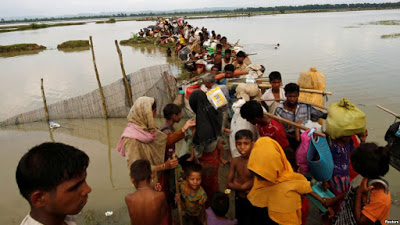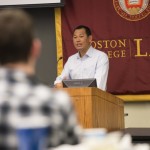The Key Issues to Consider Regarding Myanmar’s Official Proposal for Rohingya Repatriation
TRANSCEND MEMBERS, 9 Oct 2017
Maung Zarni – TRANSCEND Media Service

Rohingya refugees wait for boat to cross a canal after crossing the border through the Naf River in Teknaf, Bangladesh, Sept. 7, 2017.
Myanmar Proposes to Take Back Rohingyas [New Age, Bangladesh 3 Oct 2017]
On the Bangladeshi side, two issues:
- I understand that the IOM is responsible for the registration of Rohingyas, NOT as refugees, although the Rohingyas fits the textbook definition of REFUGEES, but as “displaced persons”.
- I also understand, from the Rohingyas on the ground, that the Rohingyas will not be permitted to put down their identity as Rohingyas, in violation of the UN-recognized right to self-identify.
On the Myanmar side, the issues are more ominous:
This repatriation talk needs to be conditioned on the provision of physical safety and access to food systems. This guarantee needs to come from the presence of international peace-keepers.
This proposal to take back >500,000 Rohingyas - who fled the country at the rate of 100,000 per week – is part of Myanmar’s pattern of tactical moves, in the face of international condemnations since 1978.
After periodic waves of genocidal attacks on Rohingyas over 39 years, which have resulted in over the displacement of 1 million internationally, this repatriation proposal by Suu Kyi-Army joint regime needs to be treated with extreme caution and skepticism.
While Myanmar reps officially talk of taking the genocide-fleeing Rohingyas back those 50% of Rohingyas who remain trapped in N. Rakhine’s vast open prisons in Buthidaung and Rathae Daung areas are progressively facing significantly reduced access to food and medicine on the ground.
Armed Rakhine gangs roam in these areas, backed by the Gov. troops, intimidating, harassing and looting anything of value from Rohingya families.
Myanmar government has already claimed state-ownership of Rohingyas’ land – within the affected region of N. Rakhine, stretching over 100 kilometres.
Where will the returnees be repatriated?
In internment camps, which will most likely be fenced off with barbed-wire, with Myanmar armed guards 24/7?
Both former immigration minister ex-Brigadier Khin Yi of Myanmar Military Intelligence and ex-Colonel Thet Htut, former Director of the inow dis-banded nter-agency Na Sa Ka headquarters in Sittwe (1998-2001), have reportedly said in the Burmese language media that the majority of Rohingyas in N. Rakhine have been there for at least 2-3 generations, meeting the eligibility criterion for Myanmar’s full citizenship.
Here is the interview with ex-Colonel Thet Htut.
The verification process is based on the assessment of INDIVIDUALS’ and their residency and ties to N. Rakhine.
But their displacement and destruction of their communities has been triggered by Myanmar’s persecution of Rohingyas as A GROUP, as an act of national policy.
In addition, Myanmar state has either destroyed any proof of documentation or issued no documentation at all to a large number.
The verification process itself is an instrument of persecution.
Finally, this repatriation proposal must not obscure the need for the international persecution of those military, Rakhine and NLD leaders, who were directly involved in commanding the latest events that result in the death, destruction and expulsion of 500,000.
______________________________________________
A Buddhist humanist from Burma, Maung Zarni is a member of the TRANSCEND Network for Peace, Development and Environment, former Visiting Lecturer with Harvard Medical School, specializing in racism and violence in Burma and Sri Lanka, and Non-resident Scholar in Genocide Studies with Documentation Center – Cambodia. His analyses have appeared in leading newspapers including the New York Times, The Guardian and the Times. Among his academic publications on Rohingya genocide are The Slow-Burning Genocide of Myanmar’s Rohingyas (Pacific Rim Law and Policy Journal), An Evolution of Rohingya Persecution in Myanmar: From Strategic Embrace to Genocide, (Middle East Institute, American University), and Myanmar’s State-directed Persecution of Rohingyas and Other Muslims (Brown World Affairs Journal, forthcoming). He holds a PhD (U Wisconsin at Madison) and a MA (U California), and has held various teaching, research and visiting fellowships at the universities in Asia, Europe and USA including Oxford, LSE, UCL Institute of Education) , National-Louis, Malaya, and Brunei. He is the recipient of the “Cultivation of Harmony” award from the Parliament of the World’s Religions (2015).
Go to Original – maungzarni.net
DISCLAIMER: The statements, views and opinions expressed in pieces republished here are solely those of the authors and do not necessarily represent those of TMS. In accordance with title 17 U.S.C. section 107, this material is distributed without profit to those who have expressed a prior interest in receiving the included information for research and educational purposes. TMS has no affiliation whatsoever with the originator of this article nor is TMS endorsed or sponsored by the originator. “GO TO ORIGINAL” links are provided as a convenience to our readers and allow for verification of authenticity. However, as originating pages are often updated by their originating host sites, the versions posted may not match the versions our readers view when clicking the “GO TO ORIGINAL” links. This site contains copyrighted material the use of which has not always been specifically authorized by the copyright owner. We are making such material available in our efforts to advance understanding of environmental, political, human rights, economic, democracy, scientific, and social justice issues, etc. We believe this constitutes a ‘fair use’ of any such copyrighted material as provided for in section 107 of the US Copyright Law. In accordance with Title 17 U.S.C. Section 107, the material on this site is distributed without profit to those who have expressed a prior interest in receiving the included information for research and educational purposes. For more information go to: http://www.law.cornell.edu/uscode/17/107.shtml. If you wish to use copyrighted material from this site for purposes of your own that go beyond ‘fair use’, you must obtain permission from the copyright owner.
